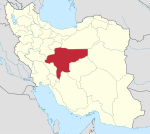Barf Anbar
Barf Anbar
Persian: برف انبار | |
|---|---|
City | |
| Coordinates: 33°00′11″N 50°11′42″E / 33.00306°N 50.19500°E[1] | |
| Country | Iran |
| Province | Isfahan |
| County | Fereydunshahr |
| District | Central |
| Population (2016)[2] | |
• Total | 5,382 |
| Time zone | UTC+3:30 (IRST) |
Barf Anbar (Persian: برف انبار)[a] is a city in the Central District of Fereydunshahr County, Isfahan province, Iran, serving as the administrative center for Barf Anbar Rural District.[5]
History
[edit]On 14 September 2003, the village of Sang Baran (سنگ بار) merged with the village of Khamsalu (خمسلو) to become the city of Barf Anbar.[4][6]
Demographics
[edit]Population
[edit]At the time of the 2006 National Census, the city's population was 5,056 in 1,257 households.[7] The following census in 2011 counted 5,336 people in 1,557 households.[8] The 2016 census measured the population of the city as 5,382 people in 1,644 households.[2]
Neighborhoods
[edit]Khamsalu
[edit]A handwritten Koran is preserved in one of the mosques of Khamsalu that was composed on the order of Hajj Reza Ali of the Kalbi family several hundred years ago. The document is unique for recounting in its last pages both the events of the famine days in Iran and for recording the prices of goods at the rates of the time.[6]
Sang Baran
[edit]As a village, Sang Baran was the capital of Barf Anbar Rural District before Barf Anbar became a municipality.[5] The residents of the village were Armenians in the past, but they migrated to Isfahan and were replaced by Muslims. There are currently three Armenian cemeteries in the Sang Baran neighborhood, each more than 200 years old.[6]
See also
[edit]Notes
[edit]References
[edit]- ^ OpenStreetMap contributors (28 November 2024). "Barf Anbar, Fereydunshahr County" (Map). OpenStreetMap (in Persian). Retrieved 28 November 2024.
- ^ a b Census of the Islamic Republic of Iran, 1395 (2016): Isfahan Province. amar.org.ir (Report) (in Persian). The Statistical Center of Iran. Archived from the original (Excel) on 19 October 2020. Retrieved 19 December 2022.
- ^ Barf Anbar can be found at GEOnet Names Server, at this link, by opening the Advanced Search box, entering "10909347" in the "Unique Feature Id" form, and clicking on "Search Database".
- ^ a b Aref, Mohammad Reza (c. 2024) [Approved 13 November 1381]. Approval of divisional changes and reforms in Isfahan province. lamtakam.com (Report) (in Persian). Ministry of the Interior, Political-Defense Commission of the Government Board. Proposal 1.4.42.55706; Letter 58538-T26118; Notification 34383/T26999H. Archived from the original on 28 November 2024. Retrieved 28 November 2024 – via Lam ta Kam.
- ^ a b Mousavi, Mirhossein (12 May 2014) [Approved 4 October 1366]. Creation of Abu Darreh, formation of four rural districts including villages, farms and places in Fereydunshahr County. rc.majlis.ir (Report) (in Persian). Ministry of the Interior, Board of Ministers. Proposal 53.1.11950; Notification 116858/T901. Archived from the original on 2 May 2015. Retrieved 5 February 2024 – via Islamic Parliament Research Center.
- ^ a b c Alavi Nejad, Ali (25 January 2019). "Historical Background of Khamsalu and Sangbaran". barfanbar.ir (in Persian). Archived from the original on 25 December 2019. Retrieved 28 November 2024 – via Barf Anbar Municipality.
- ^ Census of the Islamic Republic of Iran, 1385 (2006): Isfahan Province. amar.org.ir (Report) (in Persian). The Statistical Center of Iran. Archived from the original (Excel) on 20 September 2011. Retrieved 25 September 2022.
- ^ Census of the Islamic Republic of Iran, 1390 (2011): Isfahan Province. irandataportal.syr.edu (Report) (in Persian). The Statistical Center of Iran. Archived from the original (Excel) on 17 January 2023. Retrieved 19 December 2022 – via Iran Data Portal, Syracuse University.


